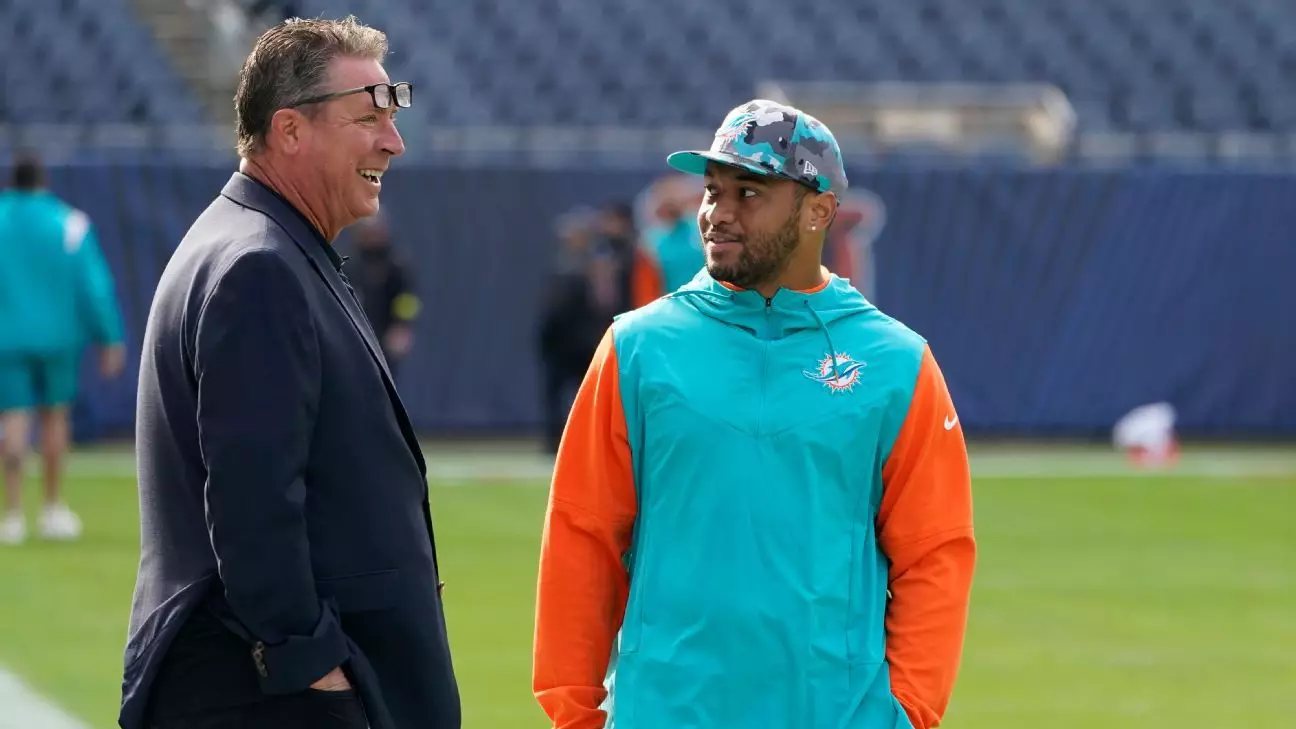In the world of professional football, the path to becoming a franchise quarterback is often laden with challenges, none more pressing than maintaining overall health and availability. Dan Marino, the Miami Dolphins Hall of Famer, has recently vocalized his support for the current quarterback, Tua Tagovailoa. During his appearance on “The Pat McAfee Show,” Marino underscored a pivotal concern: While Tagovailoa is the undeniable focal point of the Dolphins’ offense—having secured a staggering four-year, $212.1 million extension—it is crucial for the franchise and fans alike to ensure he remains healthy throughout the grueling NFL season.
Marino’s sentiments bring to light an uncomfortable reality. The talk surrounding Tagovailoa’s potential is frequently overshadowed by discussions about injuries. Marino pointedly remarked that the Dolphins boasted a promising roster until injuries dampened their performance, particularly towards the end of the previous season. The implications of this statement are multifaceted; not only does it suggest that the team could have been in a much stronger playoff position with a healthy Tagovailoa, but it also raises questions about the sustainability of his playing style in the harsh environment of professional football.
Tua Tagovailoa’s challenges with injuries became glaringly obvious last season when he missed six games—a career-high—due to various health issues, including multiple concussions and a mysterious hip ailment. The consequences of these injuries are significant, not just for Tagovailoa personally, but also for the Dolphins’ ambitions as a franchise. Each absence from the lineup not only diminishes his personal statistics but also affects the team’s rhythm and dynamics. This reality can’t be ignored; as Marino pointed out, the focus needs to shift explicitly towards health management.
The continuation of such patterns raises eyebrows and creates a dilemma for the Dolphins. General manager Chris Grier addressed this concern, emphasizing the necessity for Tagovailoa to adopt better strategies for his self-protection on the field. With every quarterback facing inevitable hits, knowing how to mitigate risk becomes paramount. Grier’s statement that Tagovailoa needs to “control what he can control” adds another layer to the ongoing dialogue regarding the quarterback’s decision-making and awareness of his physical limits.
Despite these setbacks, it is equally important to acknowledge the resilience that Tua Tagovailoa showcased during the past season. With a remarkable completion rate of 72.9%—the highest in the league—Tagovailoa demonstrated his undeniable talent and capability as a starter. His performance, which saw him throw for 2,867 yards and 19 touchdowns with just seven interceptions, certainly provides a glimpse of his potential when he’s healthy. This dichotomy presents a promising yet precarious situation for Miami; can they harness this talent without jeopardizing his health?
Tagovailoa himself has recognized the necessity of making this offseason a turning point in his professional trajectory. His frustrations over missed games due to injuries are palpable. The awareness of his injury history and commitment to rectifying it creates a hopeful narrative for both him and the Dolphins moving forward. The notion that he is now focused on addressing these health concerns indicates a proactive approach that could serve him well in the long-term.
Tua Tagovailoa’s journey highlights a broader theme in sports today: the critical intersection of talent and health in determining an athlete’s legacy. The Dolphins find themselves at a crossroads—will they prioritize the development of their star quarterback, or will injuries continue to hinder his growth? Marino’s endorsement demonstrates the faith that former legends have in Tagovailoa, yet they acknowledge that faith must be balanced with a relentless focus on effective injury prevention.
As the Dolphins prepare for the next season, it is vital for the organization to erect a robust strategy around Tagovailoa’s health. Whether that means augmenting their training staff, implementing advanced injury prevention protocols, or encouraging a more cautious approach to physical engagements, the time for critical assessment is now. As fans await Tagovailoa’s evolution, the Miami Dolphins must create an environment that respects and protects their franchise quarterback. The journey is rife with challenges, but with commitment and strategy, a brighter chapter awaits.


Leave a Reply